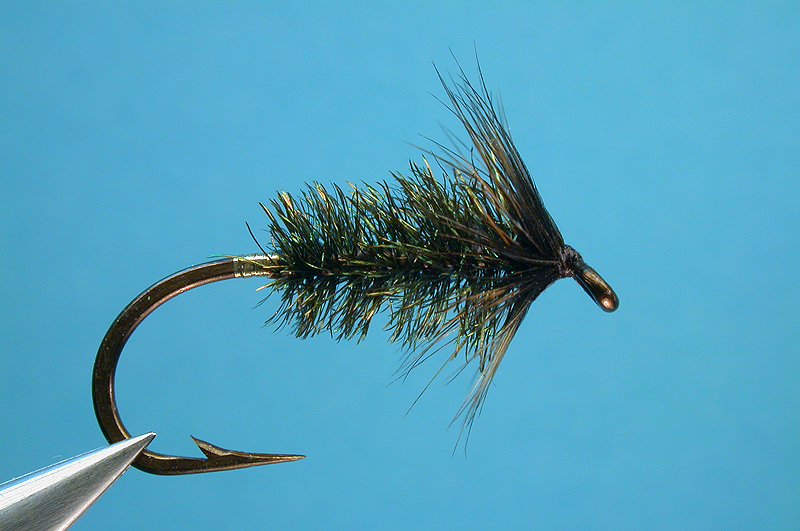Page 1 of 1
Coch y bonddu
Posted: Fri May 23, 2014 12:15 am
by Hans Weilenmann
 Coch y bonddu
Coch y bonddu
Hook: Medium wird #10 (pre-WW2) - or modern equivalent
Thread: Benecchi 12/0, dark chocolate
Hackle: Coch y bonddu, or dark furnace - webby cock - tied short
Body: Peacock herl
Tag: Krystal Flash, gold
Roc: Tying thread
Note: Pattern tied for the historical wingless wet swap - hence the hook selection, and retention of the huge barb

Cheers,
Hans W
Re: Coch y bonddu
Posted: Fri May 23, 2014 12:44 am
by Mataura mayfly
So, "does my barb look huge in this?"
Looks good- looks like a nice strong forged hook. I like those.
Somewhat more of a slender version than the usual found here (or to fall from grace off of my vice), but very nice all the same.
Once a VERY popular fly pattern here, seldom was your average "blue collar" fly fisher here without at least a couple of these in different sizes.
Nowadays, it is all about the "bling" or foam this and plastic that and seldom do you see a "Cochy" grace the waters here. I can remember starting out as a kid fishing, having graduated from bait and having a very limited income, I bludged my share of flies from older (richer) fishers I knew or met. Often it was a Coch Y Bonddu they passed over (probably just to get rid of the pesky kid tagging along!).
Re: Coch y bonddu
Posted: Fri May 23, 2014 5:06 am
by DUBBN
I am amazed this pattern fell out of favor. I have to admit, I have never seen or even heard of it prior to this post, but it seems very classy and elegant to me. I have a couple India rooster capes. I think I may have to try my hand at this pattern this weekend.
Re: Coch y bonddu
Posted: Fri May 23, 2014 5:26 am
by Hans Weilenmann
Wayne,
Never mind Jeff...
It has not fallen out of favor in Wales, where it started in the 1700's

Cheers,
Hans W
Re: Coch y bonddu
Posted: Fri May 23, 2014 5:36 am
by redietz
DUBBN wrote:I am amazed this pattern fell out of favor. I have to admit, I have never seen or even heard of it prior to this post, but it seems very classy and elegant to me.
I've taught it as an introduction to wet flies the last three tying classes that I've done. I use it regularly, and still refer to a hackle that's black in the center and brown on the edges as "coch y bondhu". I was thinking about doing for the swap.
I still have a hard time believing that it's supposed to represent a beetle.
Re: Coch y bonddu
Posted: Fri May 23, 2014 6:14 am
by Mataura mayfly
Hans Weilenmann wrote:Wayne,
Never mind Jeff...
It has not fallen out of favor in Wales, where it started in the 1700's

Cheers,
Hans W
Hans, nor has it here completely...... least in my own personal fly boxes.
I have never used hen hackle for the pattern- usually poor grade farmyard cock hackle. Often I will fish it upstream on the surface and give the line a quick strip to sink the fly at the end of the drift to let it swing as a wet.
Used from November on, it makes an excellent NZ brown beetle imitation (tied with bronze peacock), but I often wonder if it is taken for the Porina moth when fished at dusk. Interesting the grub of both insects is ground dwelling, the adult insects often end up on/in the water though.
When found here now, most often the gold tag has been dropped. I still tie with tag.
Spent a couple of weeks this past November fishing nothing but Cochy patterns, catch rate was neither up nor down on average...... but it still works.

Re: Coch y bonddu
Posted: Fri May 23, 2014 3:41 pm
by DUBBN
Jeff, Hans, do you find that this pattern does best when Beatles are present? Do you use it as a dry, or nymph, or other? Just by the looks of it, I am sure it can be used as an attractor, muck like a Prince Nymph.
Re: Coch y bonddu
Posted: Fri May 23, 2014 3:51 pm
by Mataura mayfly
Personally Wayne, I use them when these guys start hatching and taking to the wing.
http://pestweb.co.nz/?pesttypes=grass-g ... etle-adult
These beetles are nocturnal as a rule, at least they do not take to the wing until dusk as a rule and tend to lay up during the day hidden in tall grasses or in tree foliage.
If the water level rises (tidal flows on lower river reaches) or the wind blows strong enough to dislodge them- the trout love it and line up to sip them off the surface.
I fish it semi-dry as explained above, no floatant (the herl and hackle help keep it in the film) and I tie mine on slightly lighter (Kamasan 405) hooks than the one shown here, but I have also used them as a deep wet tied off the bend of a beadhead nymph.
I guess they do enough to suggest a food item- imitate no particular one- but suggest many.
Re: Coch y bonddu
Posted: Sun May 25, 2014 1:33 pm
by Kelly L.
I adore this pattern, simple, yet extremely effective!
